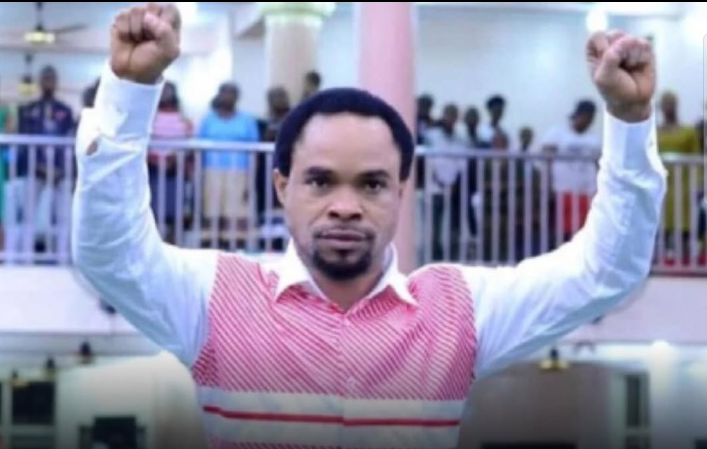
“I Have a First-Class Brain”: Prophet Odumeje Boasts He’s More Intelligent Than Educated People

Popular Nigerian preacher, Prophet Chukwuemeka Ohanaemere, widely known as Odumeje, has once again stirred public conversation with his latest declaration of intellectual superiority. During a recent church service, the flamboyant clergyman, known for his dramatic preaching style and unfiltered remarks, boldly claimed that his intelligence surpasses that of university graduates, insisting he possesses what he described as a “first-class certificate brain.”
In a video circulating online and reported by PM News, the self-acclaimed “Indaboski Bahose” passionately addressed his congregation, urging parents to guide their children towards pursuing what he termed “serious courses” in the university. According to him, too many parents allow their children to study courses that lack substance or clear direction, a situation he believes contributes to the rising number of unemployed graduates in the country.
“This is not the time to allow your daughter to pick just any course because a lecturer says, ‘this is what we have.’ Choose a very serious course,” Odumeje admonished from the pulpit, his voice booming as the congregation listened attentively.
The controversial prophet didn’t stop there. He went further to emphasize his deep knowledge and capacity for reasoning, declaring that he has read widely across different disciplines and has acquired enough understanding to guide others—even those who are formally educated. “I have read a lot of courses, and I can tell you I know them,” he said confidently. “That I have not been there doesn’t mean I will allow you to make mistakes. I am more intelligent than even the educated ones. If it’s for my brain, I have first-class certificate brain.”
Odumeje’s bold proclamation immediately triggered a storm of reactions across social media platforms, as Nigerians debated his statement with the usual blend of humor, sarcasm, and curiosity that typically follows his remarks. While some users mocked the prophet, questioning his academic background and intellectual claims, others defended him, describing his statement as a reflection of confidence and divine wisdom rather than conventional intelligence.
On X (formerly Twitter), users quickly turned his words into memes and jokes. One user wrote, “Odumeje says he has a first-class brain; please who awarded him the degree?” Another commented, “This man might not have gone to Harvard, but his confidence can power the national grid.” Yet, a few others came to his defense, with one stating, “Wisdom is not always about formal education. Some people are naturally gifted thinkers. Odumeje might just be saying he’s mentally sharp.”
This isn’t the first time Prophet Odumeje has captured public attention with his unconventional statements. Known for his theatrical style of preaching and his fusion of religion with entertainment, Odumeje has long been a polarizing figure in Nigerian Christianity. His eccentric miracles, dramatic wrestling-like deliverance sessions, and bold utterances have made him both loved and criticized in equal measure.
Supporters often describe him as a fearless man of God who speaks his mind and refuses to conform to the traditional expectations of preachers. Critics, however, accuse him of being a showman who thrives on controversy and sensationalism to keep his name in the headlines. His church, The Mountain of Holy Ghost Intervention and Deliverance Ministry in Onitsha, has become a hub for the curious and the devoted alike—people drawn by his charisma, humor, and unpredictability.
In this latest declaration, many observers believe Odumeje’s comments reflect a broader societal tension between formal education and self-taught or street-smart intelligence. In a country where access to quality education is limited and graduate unemployment is high, his statement about being “more intelligent than the educated ones” may resonate with individuals who feel that academic qualifications do not always equate to wisdom or success.
Nigeria, with its millions of degree holders struggling to find meaningful employment, has seen a growing skepticism toward the traditional education system. Many young people now turn to entrepreneurship, creative industries, and alternative learning platforms as paths to financial independence. Odumeje’s words, though controversial, may have struck a chord with those who believe that intelligence should not be measured solely by certificates or academic credentials.
Still, critics argue that his assertion undermines the value of formal education and sends the wrong message to young people who look up to him. A university lecturer from Anambra State, commenting anonymously, said, “It is unfortunate that someone with such public influence would make statements that appear to belittle education. Intelligence is multifaceted, but we should never downplay the importance of academic learning.”
Others, however, see Odumeje’s comments as an expression of self-belief rather than arrogance. “He is simply saying he trusts his own mind,” one Facebook user wrote. “Every great thinker must first believe in their brain. Whether or not he has a degree doesn’t change that.”
Despite the uproar, Prophet Odumeje has not issued any further clarification. Those familiar with his style know that he rarely retracts or explains his controversial statements. In fact, it is part of what keeps him trending—the ability to mix spirituality with entertainment and unpredictability. His followers adore him for his confidence, and his critics keep him relevant by constantly debating his words.
Beyond the humor and drama surrounding the viral moment, Odumeje’s remarks have reignited conversations about the true meaning of intelligence and the limitations of academic achievement. Many agree that some of the world’s most successful individuals did not rely solely on formal education but rather on creativity, resilience, and practical wisdom. Others insist that while intelligence can take many forms, education remains a critical foundation for progress, innovation, and informed decision-making.
Odumeje’s claim to be “more intelligent than the educated ones” might therefore be interpreted not just as boastful talk but as a symbolic challenge to rethink what society defines as intellect. Is intelligence only measured by certificates and grades, or does it also include intuition, emotional insight, and street-smart adaptability? The prophet’s assertion—though exaggerated to some—forces listeners to confront these questions.
As the debate continues online, one thing remains certain: Odumeje has mastered the art of capturing public attention. Whether he is declaring himself a spiritual heavyweight, performing his dramatic “Indaboski” miracles, or boasting of his “first-class brain,” he knows exactly how to stay in the headlines. And as long as Nigerians continue to react, he will keep supplying the soundbites that keep social media buzzing.
For now, Prophet Chukwuemeka Ohanaemere remains unapologetically confident in his self-proclaimed brilliance. “I am more intelligent than the educated ones,” he said. “If it’s for my brain, I have a first-class certificate brain.” Love him or hate him, Odumeje has once again proven that he doesn’t need a degree to make the nation listen—and argue—about his every word.


